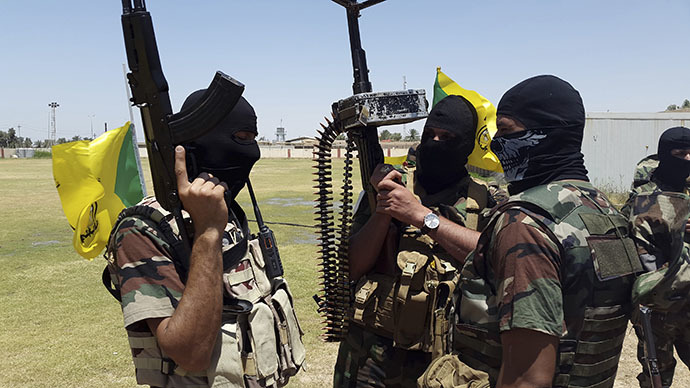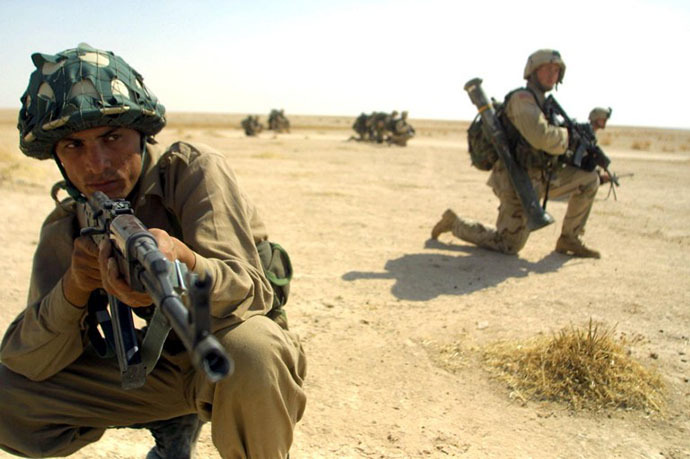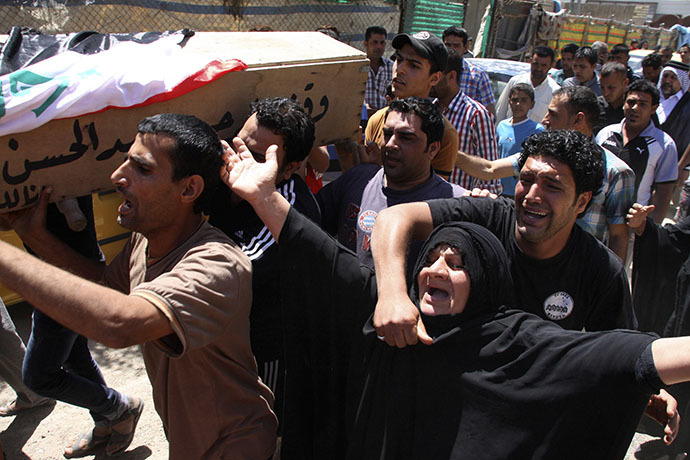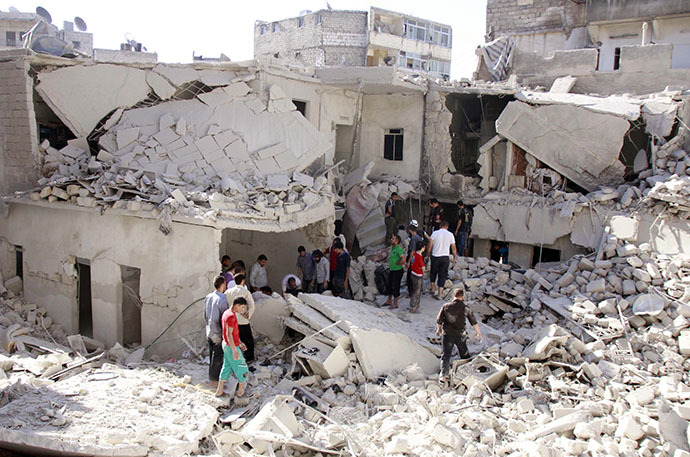Intra-Islamic Cold War and the disintegration of Iraq

The lands of Mesopotamia, united in the shape of a state known as Iraq since 1920, now seem to be on the brink of collapse.
The recent advance made by ISIS/ISIL has turned this predominantly Shi'ite country into the second battleground of a kind of Islamic Cold War. I already wrote that in tandem with a resurgent New Cold War between the West and Russia-and-China the Islamic world is now being tested by an increasingly more and more overt conflict between the Sunni faction and the Shi'ite minority.
Syria's not-so civil war, which started as an armed attempt to oust the Assad regime from Damascus has become a battle between Sunni extremist groups and the Alawite regime, closely allied to Iran, and representing the Shiite faction. At first, the extremist group Jabhat Al Nusra seemed predominant, but then it was superseded by ISIS/ISIL entering the fray from Iraq where this organization had previously been known as Al Qaeda in Iraq (AQI) and led by Abu Musab al-Zarqawi (killed by the Americans in 2006). The rebranding indicates the scope of its ambitions, and it should hence not come as a surprise that ISIS, currently led by Abu Bakr al-Baghdadi, has now returned to its original home-base. Originally, Zarqawi's goal had been to establish a "Caliphate" in Iraq, and in its new guise, his successor Baghdadi employs his armed groups to establish an "Islamic state" (which on a semantic level is basically synonymous with the term caliphate) in the lands of Mesopotamia and the Levant.
In Syria, Assad's forces appear to have regained the upper hand, a fact which probably convinced Abu Bakr al-Baghdadi that returning to Iraq was but a viable option. Ever since the American invasion of Iraq in 2003, the territorial and political integrity of the country has been compromised. At the time of the invasion, many critical voices were heard declaring that the US intervention would spell the end of Iraq and the beginning of sectarian violence leading to a veritable civil war.

Many people at that time also spoke of a project for the "Greater Middle East" (GME), a design floated by the State Department, National Security and Department of Defense in Washington on the one hand, and the foreign departments of France and Germany, on the other. But quite apart from lofty rhetoric about the GME, the US military action undermined Iraqi cohesion from the very beginning, and this process of disintegration was originally started by the "viceroy" Paul "Jerry" Bremmer. He disbanded the entire Iraqi army on 23 May 2003 by means of issuing Order Number 2. The 400,000 unemployed Iraqi soldiers subsequently melted away and then arguably formed the backbone of the armed resistance against the US-led occupation – one should not forget that Bush Jr. was the proud leader of a Coalition of the Willing that held the lands previously ruled by Saddam.
After many years of fighting opposition forces, troop surges, inter-communal violence, and financial support given to Sunni tribal militias, known as Sahwa, to fight Sunni terrorist employing the name Al-Qaeda, the state of Iraq re-emerged again on the international scene. Even though Bremmer's order had seemed to usher in the dissolution of the state of Iraq, in the end, the US proved able to hold the country together. Iraq's central government, headed by the now ailing President Jalal Talabani since 2005 and Prime Minister Nouri al-Maliki since 2006, has so far been able to preserve the integrity of the Iraqi state and even initiate the sale of Iraq's greatest prize, its vast reserves of oil. The only blemish on the seal of Iraqi unity is constituted by the erstwhile Kurdish no-fly zone that has become the quasi-autonomous KRG or Kurdistan Regional Government.
Divided country
The lands that are now united in the state of Iraq do not harbor a homogeneous population, the majority of Iraqis are Shi'ites (around 65%), with a sizeable Sunni minority (around 32%) and all but negligible and ever-dwindling Christian remnants (around 3%), in addition to various ethnic sub-groups as well (such as the Assyrians and the Turcoman groups). Last year, the Unrepresented Nations and Peoples Organization declared that Iraq still possesses a "unique religious and ethnic diversity".
The minority Kurds in the north of the country have now effectively achieved autonomy. But rather than promulgating inclusive policy that would unite the disparate elements of Iraq's population, the Maliki government has been acting in a way favorable to the Shi'ite cause, thereby disenfranchising the Sunni minority and fanning the flames of sectarian violence. The international non-governmental organization Human Rights Watch, in its World Report 2014, indicates that Iraq's central "government [has in the past] responded to largely peaceful demonstrations with violence and to worsening security with draconian counterterrorism measures. Borders controlled by Iraq’s central government remained closed to Syrians fleeing the civil war, while as of November [2013], nearly 206,600 Syrians fled to the Kurdistan Regional Government (KRG)-controlled area. In December 2012, thousands of Iraqis took part in demonstrations in mostly Sunni areas, demanding reform of the Anti-Terrorism Law and the release of illegally held detainees. Prime Minister Nouri al-Maliki announced in January 2013 that he had created special committees to oversee reforms, including freeing prisoners and limiting courts’ use of secret informant testimony. [But by January 2014], there was little indication that the government had implemented reforms. Security forces instead used violence against protesters, culminating in an attack on a demonstration in Hawija in April [2013], which killed 51 protesters. Authorities failed to hold anyone accountable. The [Maliki] government responded to increasing unrest with mass arrest campaigns in Sunni regions, targeting ordinary civilians and prominent activists and politicians under the 2005 Anti-Terrorism Law. Security forces and government supporters harassed journalists and media organizations critical of the authorities".

In fact, "2013 has been the deadliest year [in Iraq] since 2008", as reported by RT. Barbara Slavin, a senior fellow at the Atlantic Council’s South Asia Center, now even claims that, despite Maliki's victory in "parliamentary elections in April [2014] to give him a potential third term in office, Maliki has yet to form an inclusive government with a Sunni buy-in or resolve differences over oil exports with the Kurds. With his country falling apart around him, [the ISIS advance] is more than a wakeup call; this is probably Maliki’s last chance to overcome his sectarian Shi'ite roots and work with other ethnic and religious factions to preserve an even nominally united Iraq". But that seems highly dubious as it has become increasingly obvious that Iraq-under-Maliki has taken up its position in the intra-Islamic Cold War, in spite of any inclusive rhetoric now emerging on his part.
But this intra-Islamic Cold War also has an important external component. The New Cold War, currently being fought in the proxy-battles of the Ukraine, has once again led to a whole host of awkward alliances and strange bedfellows. As a result of Turkey's status as a NATO member its position at the side of the US and its allies was never in doubt, and coupled with the country's Sunni Muslim identity, reinforced by its AKP-led government headed by the charismatic yet polarizing Recep Tayyip Erdogan, Turkish support for the Syrian opposition has also always seemed like a natural course. In the course of the conflict Turkey has been overtly and covertly supporting extremist groups active in Syria. Some months ago, Abdullatif Şener, a co-founder of the AKP (or Justice and Development Party) in 2001, who left AKP in 2007 and has since joined the ranks of Erdogan’s critics, literally stated that that “there is a [direct] link between Turkey and [Al-] Qaeda elements", arguably referring to such armed bands like Jabhat Al Nusra and ISIS.
The big losers
Like Iraq-under-Maliki, Turkey-under-Erdogan has also taken up its position. But this ideological opposition between the two neighbors did not stop a certain rapprochement with regard to the important issue of oil and gas sales. In this respect, Turkey has actually been in close cooperation with the KRG, possibly also informed by concerns over Turkey's internal Kurdish issue, and at times trying to accommodate Nouri al-Maliki as well. But now that ISIS/ISIL has moved the battle into Iraq once again, Turkey's tortured relationship with certain "[Al-] Qaeda elements" has come out in the open. Following the capture of the town of Fallujah, erstwhile scene of bloody battles between US forces and Iraqi insurgents, ISIS recently also took Iraq's second-largest city of Mosul and from there started streaming south, threatening Baghdad and other locations as well. The initial response of the Iraqi army was feeble and subsequently, the Prime Minister as well as Ayatollah al-Sistani appealed to the population to take up arms and volunteers started pouring in replenishing the ranks of the army and raising the morale of the State of Iraq that now appears to be on the verge of disappearing. The Bush invasion began the dismemberment of Iraq, reintroducing sectarian divisions and solidifying them by means of accepting the result of "ethnic cleansing" (symbolized in the concrete wall that were used to divide the neighborhoods of Baghdad), and now Al Qaeda in Iraq (AQI) in its current guise as ISIS is bringing this policy to its conclusion.
Syria's not-so civil war next door provided the impetus for the current volatile situation in Iraq, and while I have earlier documented Turkey's important role in devising the violence in Syria in support of US strategy; now, one could argue that Erdoğan's Syria policy has all but backfired. After Mosul fell, ISIS occupied the Turkish Consulate and took 49 members of its staff hostage, adding their numbers to those of the Turkish truckers (31) already held by the terrorist group. The consular staff was caught off guard, as just prior to ISIS' capture of Mosul, Turkey's wily Foreign Minister Ahmet Davutoğlu talked to them via the telephone reassuring them that "ISIS is not hostile to Turkey, they will not harm you. Do not leave the Consulate", as related by the well-known Turkish journalist Selahattin Önkibar. In the face of this tragedy some AKP members decided to launch a verbal counter attack. For one thing, the wily Davutoğlu has now publicly declared that "All those involved should know that if our citizens are harmed in any way, they will be the subject of harsh reprisals". While the AKP member of parliament Mehmet Metiner has now also come out to claim that the "external forces" behind the Gezi protests last year have now concocted the ISIS capture of the Turkish Consulate in Mosul.

But quite aside from such absurd proclamations, reports have now also surfaced that a number of ISIS militants had been residing in hospitals in southern Turkey close to the Syrian border for months. In particular, claims that a certain Mazen Abu Muhammad received medical treatment in a Turkish hospital last April appear disturbing, as this individual seems to have ordered the attack on the Turkish Consulate. But the catalogue of AKP complicity goes a lot further: according to the opposition CHP member İhsan Özkes, the now-disgraced Minister Muammer Güler earlier sent orders to the governor of the province of Hatay, arguing that support for the Jabhat Al Nusra seemed imperative in the fight against the Kurdish insurgents PYD, linked to the Turkish PKK. Güler even intimated that Turkey's Intelligence Organisation MİT was involved in securing safe border crossings for the Jihadi fighters. Additionally, Özkes has also claimed that members of Al-Nusra have stayed in guesthouses belonging to the Turkish Directorate of Religious Affairs (Diyanet). The ISIS fighters that have now infiltrated Iraq are a motley crew, comprising "westerners, Iraqi Baathists, Wahabis, Turks, Arabs and central Asians", as reportedly claimed by an unnamed Iranian intelligence source. According to the Turkish journalist Tolga Şardan then, Turkish fighters who have joined the fight in Syria were earlier active in such jihadi hot spots as Afghanistan and Pakistan. Turkey and the US now emerge as the big losers in this game of alliances and counter-alliances, as Syria's not-so civil war has now opened up a new front in the intra-Islamic Cold War.
The US, as the major culprit in the region, has till now amassed a grand total of four naval vessels in the Persian Gulf – USS Mesa Verde, USS George HW Bush, USS Philippines Sea, and the USS Truxton. On Friday the 13th, President Obama declared that he "will not be sending US troops back into combat in Iraq, but I have asked my national security team to prepare a range of other options that could help support Iraq's security forces". And arguably, long-range missiles fired from the Persian Gulf would fit the bill.
The statements, views and opinions expressed in this column are solely those of the author and do not necessarily represent those of RT.
The statements, views and opinions expressed in this column are solely those of the author and do not necessarily represent those of RT.













